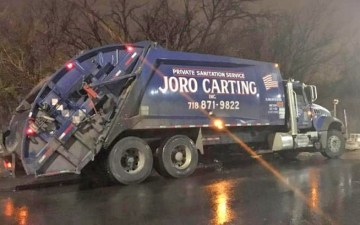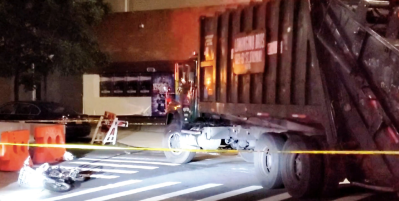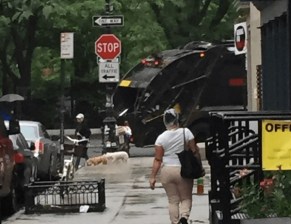City Council Poised to Require Side Guards on 10,000 Trucks by 2024
The City Council transportation committee unanimously passed a bill this afternoon that would require side guards, which keep pedestrians and cyclists from being swept beneath a truck’s rear wheels, on approximately 10,000 New York City trucks by 2024. The legislation, likely to pass the full council tomorrow, mandates the add-ons not just for city-owned trucks but also for private trash haulers.

The bill would significantly expand a 240-vehicle pilot announced earlier this year by the de Blasio administration. “While I applaud the administration for this first step, we need to go further, both within our city fleet and those private vehicles with the highest fatality rates,” said Council Member Corey Johnson, who sponsored the bill.
Johnson’s bill has two parts. First, it would mandate side guards on all vehicles in the city’s fleet weighing more than 10,000 pounds, with exemptions for street sweepers, fire engines, car carriers, and off-road construction vehicles. The city owns 4,734 vehicles, about half of them garbage trucks, that are candidates for side guards, according to a report produced for the city by U.S. DOT.
The average life of a DSNY garbage truck is eight years, so Johnson’s bill delays the side guard requirement until 2024, by which point the current fleet will be phased out. Equipping new vehicles with the guards costs less than the approximately $3,000 to install them on an existing vehicle, said Louis Cholden-Brown, Johnson’s director of legislative and budget affairs. “The goal is to get these pre-made into the contracts,” he said.
The second part of the bill expands the side guard mandate to trucks owned by private trash haulers regulated by the city’s Business Integrity Commission. If private haulers don’t add side guards by 2024, they could be fined or lose their license to operate in the city.
“We know it’s coming. The first words from the leadership were, ‘We’ve got to get behind it,'” said Steven Changaris, northeast regional manager for the National Waste and Recycling Association, which represents private haulers. “It’s about safety, so you know, we want to be safe.” Changaris said his group wants to work with the city during the rule-making process to make sure companies can meet the mandate for side guards, which are currently not standard equipment on most U.S. trucks.
Requiring side guards on private trash trucks is particularly important. Private haulers not only outnumber the Department of Sanitation’s collection fleet, they also drive more, traveling an estimated 12 miles per ton of waste collected, compared to just four miles per ton for the city-owned fleet, according to a 2012 report produced for DSNY [PDF].
Although professional truck drivers typically have safer records per mile than the general public, the size and constant presence of trucks pose an outsized risk to pedestrians and cyclists. Trucks comprise 3.6 percent of vehicles on New York City streets, but account for 12.3 percent of pedestrian fatalities and 32 percent of bicyclist fatalities, according to U.S. DOT.
Side guards have a proven track record of reducing fatalities. After the United Kingdom began to require side guards in 1986, the fatality rate for pedestrians hit by the side of a truck fell by 20 percent. The fatality rate for cyclists decreased 61 percent.
Other council members saw the action on truck side guards as inspiration for additional fixes. “I hope that the MTA is looking at what we are doing here today and that they will consider putting these safety measures on their buses as well,” said Council Member Antonio Reynoso, who has advocated for the equipment.
The transportation committee also unanimously advanced two other truck-related bills this afternoon. A bill from Council Member Margaret Chin would require DOT to study pedestrian and bicycle safety along truck routes and the impact of tolling policy on encouraging truck traffic on surface streets. A bill from Council Member Paul Vallone would require DOT to study driver compliance with truck routes.



